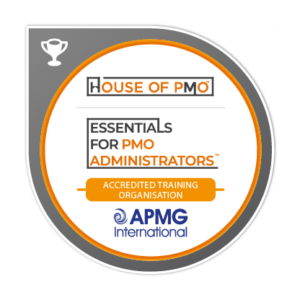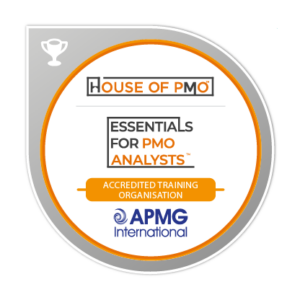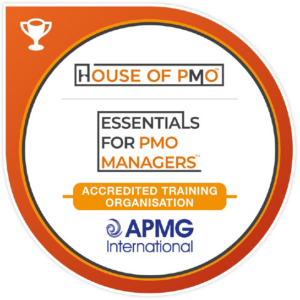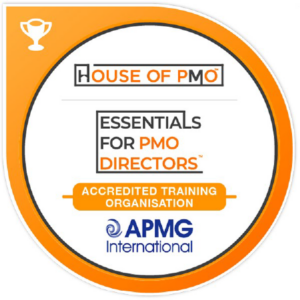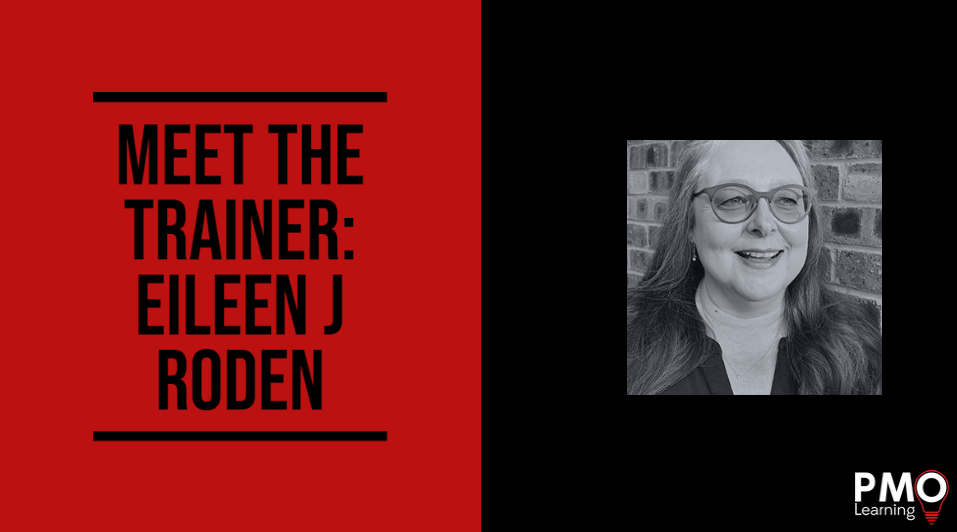
Our next installment in our Meet the Trainers series is Eileen J Roden, PMO Learning Director and trainer of P3O® and MoP® courses, House of PMO Essentials courses, Project Sponsorship and the PMO, Foundations of PMO Leadership, Setting Up a PMO, Benefits Management, and Facilitation Fundamentals of the PMO courses.
Briefly introduce yourself.
I’m Eileen Roden, Director and Co-founder of PMO Learning and also of the House of PMO. People might also recognise me as the Lead Author of Axelos’ P3O® Best Management Practice and the House of PMO’s PMO Competency Framework.
Red or brown sauce?
Brown, though I will had a splash of red where chips are involved.
What is one book everyone should read?
The book everyone should read is Stephen Covey’s The 7 Habits of Highly Effective People. It doesn’t seem to be so much in fashion at the moment, even though it was the major text for many management programmes back in the 80s and 90s. I still believe the 7 habits hold true (and even the 8th habit which he subsequently put in an additional book).
Tell us a little about your PMO career
Well, as far as PMO is concerned, it was accidental! I started off in IT, and although I loved the analysis element, I really didn’t enjoy the detailed coding and couldn’t get my head round the boxes and wires. However, what I was quite good at the organisation of the work that needed to be done, so very quickly moved from an IT techie to an IT Project Manager. Still not my favourite job, but definitely better than coding. Around this time, I was looking at doing some further development, and I was in a role that involved in the management of people, I decided to do my HR certifications. Unsurprisingly, my organisation decided to use my knowledge and I was given the role of HR Manager. It was while doing this role (which I loved – especially the part of the job that involved supporting the development of people), I was asked to work on the forecasting of resources (and associated costing) across projects, programmes and business as usual. This naturally led into moving it into the PMO to start linking to estimates, methods etc. I genuinely thought, and have said many times before, ‘that I had died and gone to heaven’. Since then, I’ve not wanted to work anywhere else, and haven’t done. I worked for a number of organisations which provided me with some real lessons on good and bad ways to establish PMOs before becoming a trainer/consultant. I’m still learning the many different ways in which PMOs can be designed and implemented – some good, some not so much.
What has been the highlight of your PMO career?
The highlight was probably at Cadburys Schweppes. We implemented a global method and a global tool, and we were in the lovely position of the PMO doing exactly what the organisation needed the PMO to do. The staff were really engaged – not just with the project delivery team, but also with senior management who recognised and valued what we did. We had fantastic relationships with Finance and HR. As in most organisations, status quo never lasts long. We got new people in some senior positions who wanted something different, and for me that nearly broke my heart! They were right in their doing so, but at the time I couldn’t bear to change into what the organisation needed because I was so convinced that what we had was perfect. I now know different, and recognise that the PMO needs to continue to transition with the organisation.
What has been the lowest point in your PMO career – and what did you learn from it?
I’ve had some downs in my career but not when I’ve been working in the PMO. I’ve had periods in my career where the senior team that I was part of never got past storming and never became a team. From a PMO perspective, there was a while at Cadburys where I struggled to get senior management buy in for a couple of years. As I’ve already shared – although it took a while, we did eventually demonstrate how we could solve some costing and scheduling issues that were impacting the business.
Which courses do you deliver with PMO Learning?
P3O® and MoP® courses, House of PMO Essentials courses, Project Sponsorship and the PMO, Foundations of PMO Leadership, Setting Up a PMO, Benefits Management, and Facilitation Fundamentals of the PMO courses. I also spend quite a bit of my time doing bespoke courses that are tailored for individual organisations. I also enjoy the time I get to do individual coaching.
What’s your perfect delegate like?
Somebody who is prepared to ask questions. Somebody who listens, but is prepared to ask questions not just of me, but of the other delegates. Delegates who really wants to get under the skin of the content. They get past the idea of “what do I need to know to pass the exam?”, and is really interested in terms of making it work in their organisation, with a curiosity and interest in how it works in other organisations.
Describe the House of PMO Essentials courses in 5 words
New, broad, enlightening, practical and fun.
Why should delegates take the House of PMO Essentials courses?
I think because very often, people who start in entry level PMO roles haven’t had many jobs, or been in many organisations. Really at whatever level you join the PMO, your knowledge is limited by your own experience, and so each of the Essentials courses gives a really good overview of the breadth each the roles could be. So it covers off lots of things you may never come across – it gives you the insight of what you could get asked to do as a PMO Manager, for example. The other thing is, it gives an opportunity for delegates to position their roles – we’ve had quite a few people say on the Essentials for PMO Administrators course, when they hear of the other roles, “oh actually, I’m doing a bit of the Analyst role too. Most importantly from our perspective, it gives them an understanding of where their job can go, and build up their knowledge and skills to become competent at doing their role.
What is your favourite part of being a trainer?
Having delegates at the end of the course who are able to say “that’s been really helpful, that’s going to make a difference to me at work.” Gives me a real buzz.
How can delegates implement what they’ve learnt on the course into their day-to-day role?
That’s part of the beauty of the Essentials courses – like any certification course, we have a syllabus that needs to be covered, but we make the time to discuss what delegates are looking to get out of it. We always ask delegates for their objectives at the beginning of the course, and allow delegates to talk about their specific question, problem, or take on things.
What is one piece of advice you would give to those working in a PMO?
What I wish somebody had told me is that recognise that all PMOs are different, they will never be static, and they have to continue to change.
What is the biggest challenge for those working in PMOs currently?
It’s a similar challenge that has just changed over the years. We used to suffer as people only considered the PMO as admin, we had a meeting with a group this week and in a lot of their minds, it’s where a lot of PMOs still are, so we still have quite a bit of baggage. Conversely, I think that a number of people think that PMOs can do everything, so they look at something like the PMO Service Catalogue or the PMO Competency Framework and they think “should our PMOs be doing all of that?” We have the challenge of prioritising and selecting what are the most appropriate services to offer. So the challenges we face are being limited to just admin, or expected to do everything, and nothing in between.
Throughout your PMO career, what has been the biggest change you have seen in the profession?
I think it’s that wherever projects and programmes go, PMOs are not far behind. We’ve seen an explosion of the understanding of projects in an organisation, and the world is changing so fast that there isn’t any organisation that doesn’t have a whole list of projects or a recognition of what needs to be changed in their organisation. Therefore, what was perhaps the remit of large construction companies, or professional services organisations, or even the IT department – we now have projects across the whole organisation and recognition that a PMO can help. So generally there’s two changes – the breadth, how many PMOs are out there in every organisation but also the increasing number of senior PMO roles in the organisation, not just linked to the delivery of projects, but also the success of the organisation by recognising the combination of business as usual AND project development work that actually makes them successful.
What’s the most interesting thing developing in PMOs today?
There’s three different things I can think of – one is the development of AI and data reporting and how technology is moving, which is going to change and bring some new roles into the PMO.
We used to talk about accidental project managers, then setting up project divisions and I think we’re almost going back to having lots of continuous development and agile methodology, we’re going back to talking about hybrid – it’s not just about the methods, but also about recognising that lots of projects are being delivered in BAU departments which means PMOs have much more of an organisational role then just stuck in the project corner.
Thirdly is the development of the profession, and recognising PMOs can do so much to help the delivery of an organisations suite of projects, or their portfolio, rather than just being seen as under the project managers. It’s about continuing to build the profession and the value it can add so eventually, even my mum might understand what a PMO does!
What is your hidden talent/party trick?
Not sure if it’s a hidden talent but I can talk for England about anything! Actually, what I think I’m very good at is explaining complex theory in simple terms. During training I often mention the kids, and our family, and have what is now an infamous end to end planning example using the family meal of sausage and mash example! I think I can relay quite complex things in understandable terms.
The P3O® and MoP® courses on this page are offered by PMO Learning. P3O® and MoP® are [registered] trade marks of AXELOS Limited. P3O® and MoP® are registered trade marks of AXELOS Limited, used under permission of AXELOS Limited. The Swirl logo™ is a trade mark of AXELOS Limited, used under permission of AXELOS Limited. All rights reserved.
Enjoying Our Blog?
Sign up and receive all our articles (we’ll send you an update once a week!) plus special offers and events:
This post contains affiliate ad links.






